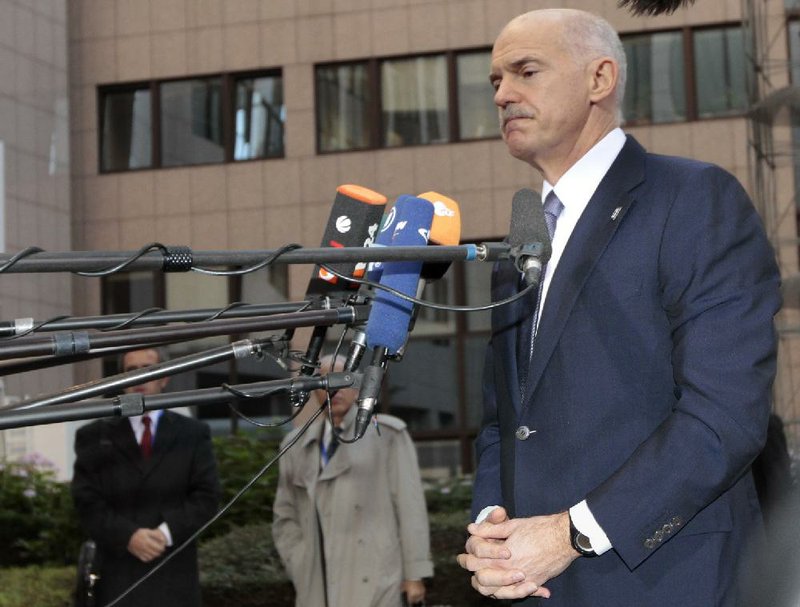LITTLE ROCK — European leaders announced Wednesday that they had agreed on plans to shore up the region’s banking system, seeking to contain a spreading debt crisis and prevent a new recession.
The 27-member European Union said banks would be asked to raise about $150 billion in new capital as a buffer against possible losses on their holdings of European government bonds that have declined in value.
The agreement represented the most tangible progress made by European leaders after days of crisis negotiations.
The smaller group of 17 European nations that share the euro, meanwhile, continued talks in Brussels over a series of related problems. These include how to best use the limited resources of the bailout fund set up by the eurozone countries.
European leaders agreed this morning on a crucial plan to reduce Greece’s debts and provide it with more rescue loans so that the faltering country can eventually dig out from under its debt burden.
After a marathon summit, EU President Herman Van Rompuy said that the deal will reduce Greece’s debt to 120 percent of its gross domestic product in 2020. Under current conditions, it would have grown to 180 percent.
That will require banks to take 50 percent losses on their Greek bond holdings - a deal that negotiators will now have to sell to individual bondholders.
Van Rompuy also said the eurozone and International Monetary Fund - which have both been propping the country up with loans since May 2010 - will give the country another $140 billion.
Efforts to increase the clout of the bailout fund got a boost earlier in the day when German Chancellor Angela Merkel won an endorsement from lawmakers in Germany for her plan to reinforce the fund.
Italian Prime Minister Silvio Berlusconi, meantime, arrived in Brussels with plans to change the country’s pension system and take other steps to balance the budget. Other European leaders had pressed him to accelerate those steps to help build confidence his nation can manage its large public debt.
Because the plan to shore up the banks applies to European economies both inside and outside the euro area, the initiative was the subject of deliberations by the full European Union.
Along with increasing bank capital, the plan calls for a new effort by governments to ensure that banks have the funds they need to operate. European banks rely heavily on short-term loans to conduct business and the vulnerability of that funding played a role in the recent collapse of the French-Belgian Dexia bank.
Concerns about the European economy have caused many investors, including U.S.-based money market funds, to pull out of European banks. This development has raised bank operating costs and generated fear that Dexia would be just the first in a series of casualties.
The new plan asks the European Central Bank, the European Investment Bank and other agencies to “urgently explore” a guarantee system so that banks could wean themselves from short-term loans, which often must be renewed weekly or even daily.
Under the plan, banks would have to set aside capital equal to 9 percent of their assets. That represents a significant increase from the 5 percent level used as a standard by the European Banking Authority, when it recently analyzed whether the region’s financial firms could weather a new economic downturn.
One concern about increasing relative capital levels is that banks could reach the 9 percent threshold by decreasing their total assets, in other words reducing how much money they loan to businesses, consumers and governments.This pullback could stymie economic growth at a time when it is already slowing in much of Europe.
To head off this prospect, the bank capital plan calls for heightened oversight by regulators to ensure that banks don’t achieve the new targets by selling off assets or restricting new loans. Regulators “must ensure that banks’ plans to strengthen capital do not lead to excessive deleveraging, including maintaining the credit flow to the real economy,” the EU statement read.
Banks will have until June 30 to meet the new requirement. Some analysts criticized that time frame, saying a quick and broad infusion of money was needed across the European financial system. Banks that cannot raise the money on their own may seek government loans or support.
In winning the endorsement of German lawmakers for her bailout proposal earlier Wednesday, Merkel warned that Europe could be headed for financial disaster if its common currency fails.
“The world is watching Germany and Europe to see if we are ready and able to take responsibility,” Merkel told a packed parliament before the vote. “If the euro fails, Europe fails.”
Merkel said deep changes must be made to Europe’s economy if the euro is to hold together as currency. But she offered few concrete details about the steps she would take to protect it.
In Italy, Berlusconi and Northern League leader Umberto Bossi reached a compromise on raising Italy’s retirement age - a point of disagreement that had threatened Berlusconi’s leadership. His majority in parliament needs the support of the Northern League party.
A scuffle started Wednesday in Italy’s Chamber of Deputies when League lawmakers briefly fought with colleagues loyal to a former Berlusconi ally, Gianfranco Fini, the Chamber president who broke with the governing coalition early in its term.
League deputies were angered when Fini, on a TV talk show, mentioned that Bossi’s wife, took early retirement from a teaching job when she was 39.
Information for this article was contributed by Colleen Barry, Gabriele Steinhauser, Don Melvin, Sarah DiLorenzo, Sylvie Corbet, Juergen Baetz, Geir Moulson, Raf Casert and Robert Wielaard of The Associated Press.
Front Section, Pages 1 on 10/27/2011
